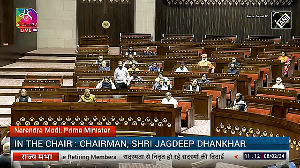The company's cice-chairman and Managing Director Shahzaad Dalal tells Raghavendra Kamath & Nevin Johnthat IIML will invest in companies that are well-funded and can survive the downturn. Excerpts:
What do you think of the current downturn in terms of investment?
Though the short-term is bad, the situation should be okay in the medium- to long-term. And since we are in the business of investing in the medium- to long-term, we see this as a great time to be able to look at transactions and make investments. We probably have to be a lot more cautious, making sure that the companies we invest in are well-funded and that they can survive the downturn and come out stronger. These are the key characteristics we are looking for in our investments. In the medium-term, things will improve. And when they do, we will be on a very good wicket.
How long do you expect this turbulence to continue?
Things will get normal in another 18 months. It will take time for the psyche of banks, especially international banks, to change so that they start going back to lending in a big way. Circulation of money has to improve for the whole economy, and it needs to improve especially in the western markets as they have repercussions everywhere.
Have you gone slow on investments in the last six months and brought down your investment threshold?
We have been investing consistently. We have done at least seven-eight transactions in FY09 so far. In 2008 and 2009 together, we have done 15-odd transactions. Our average investment is in the region of $25 million and we have been pretty consistent.
Recently, you raised an $895-million real estate fund. How difficult or easy is it to raise funds now?
It is very difficult to raise funds in this market. The main reason is that, no matter how good or bad you are, investors do not have liquidity. And without liquidity, they cannot make any commitments for the future.
You promised 25 per cent returns to investors. How confident are you of meeting this target?
We have not promised anything. We just aim for returns to be in the region of 25 per cent, but we promise nothing. There are no guaranteed returns on our funds. What we commit to our investors is that we will find the best of investments and reduce the risk as far as possible, while maximising returns to the best of our ability.
With most Indian companies having lost their AAA investment ratings, quality of investment has become a crucial issue. How do you look at it?
We look at strong companies. We tell them to conserve liquidity and conserve cash so that they can survive this period of downturn and come out stronger.
What are the sectors you are still bullish on during these times?
We are looking at strong companies because, irrespective of the sectors they operate in, they will come out (of this downturn). In every sector, there are winners and losers. We are bullish on the infrastructure sector, such as roads and telecom projects, power and pharmaceuticals and life sciences. Valuations in the engineering sector are very attractive today.
There were concerns about limited partners (LPs) backing off from their commitments. How has that affected you?
It is already a big issue for many people, especially for those funds which have a high proportion of individual investors, since their liquidity has dried up. But we are fortunate that all our LPs are with us. Except for one fund, we have not tapped individual investors.
What do you think of the sharp downturn in the real estate sector?
It is a highly cyclical sector. It has seen ups and downs and we have already experienced it. It will go down further we are conscious of that. In the long run, it will come up. If there is a modest price, there is good demand.
Earlier, people claimed that they will launch and close funds in four months. Is the fund-raising process more prolonged now?
Nobody can raise funds in four months. The fastest fund-raising was done in nine months. In today's environment, it will take at least 18 months. Worldwide, the average for the industry is two years.
Market valuations for most of the companies have fallen by over 50 per cent. How do you look at it?
It does worry me because public markets are one of our exit options. The valuations are very low today. I am not saying that we need a price-to-earning ratio of around 25 to 30, but a modest range of 10 to 15 is a must.







 © 2024 Rediff.com -
© 2024 Rediff.com -